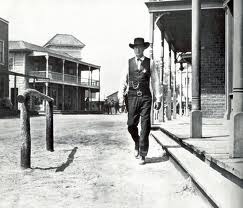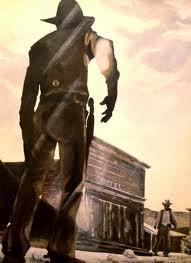The Showdown: Writing Diagnostics IX(a)

HIGH NOON image courtesy of United Artists.
When planning a story, you need to know where and how it's going to end. No doubt you're aware that a climax of some sort looms on your idea's horizon, but perhaps you aren't quite sure what it entails or how it's set up or what should go into it.
It can be so tempting to just launch your protagonist into trouble at the start of a story and see what happens. How creatively liberating! Right? Well …
When I was a child, my parents usually visited my grandmother on Sunday afternoons. She lived in a rural area about an hour's drive from our house. If we happened to leave early when homeward bound, my father liked to turn down a road at random and see where it came out. Sometimes we found a cool discovery, but otherwise we just meandered around and wasted a lot of time. Occasionally we found ourselves way off course and then it took so long to get home that I would miss my favorite TV program and Mom wouldn't have sufficient time to prepare the dinner she'd planned.
If you wander around in your story because you don't know where you're going, readers are likely to lose patience with you. And you will find yourself hitting a lot of dead ends and having to redo pages. You may even get so stuck you abandon the manuscript without completing it.
Think of climax as your story's destination. From the sentence that introduces the story question to the plot, the ending becomes a much-anticipated element. Clashing goals, scenes of conflict, and progressive setbacks all work together in driving characters — and -readers — to this showdown.

Gary Cooper must face his enemy in HIGH NOON's climatic showdown. Image courtesy of United Artists.
Once you get everyone there, you need to settle matters, once and for all, between the protagonist and antagonist. In movie terms, it's called "the third-act payoff."
The story goal creates the story question, and the story question is answered in the climax. Not with a maybe. Not with it was all a dream. But with a YES or a NO.
Yes, the protagonist overcomes the story problem and saves the day and finds the solution in the nick of time and wins true love, wealth, and happiness.
Or …
No, the protagonist crumbles at the key moment of crisis instead of showing courage and so fails and is left alone, miserable, wretched, and ruined.
When evaluating your plot for soundness, ask yourself if you're planning a big or intense confrontation between hero and villain or if you're just hoping to achieve some sort of muddled stopping point.
It has nothing to do with luck, and everything to do with utilizing the writer's craft.








C. Aubrey Hall's Blog
- C. Aubrey Hall's profile
- 7 followers



